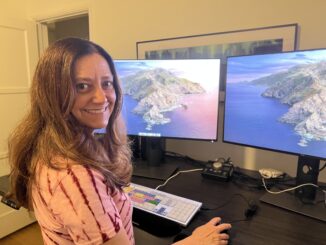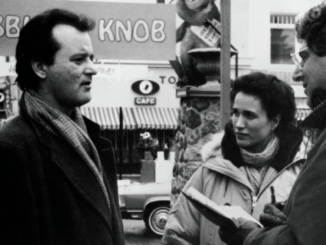
by Rob Feld • portraits by Sarah Shatz
Music editor Mitsuko Alexandra Yabe exemplifies the possibilities offered by the world of post-production if one is willing to throw oneself in and find one’s way. Yabe was born in New York but grew up in Tokyo, where she trained in violin and taught herself guitar. She was pre-med at Pomona College but got involved in the music scene in nearby Los Angeles, playing in a few sessions and producing music.
After graduating, she moved to New York City to pursue a career in the arts and entertainment industry. Broadening her search, Yabe met a network post-producer at an alumni event who told her that a company was looking to fill an entry-level position in television post-production. She got the gig — transcribing interviews for producers on the reality crime series The First 48 (2004-present) for ITV Studios (formerly Granada Entertainment) — and eventually joined the Editors Guild as an edit room assistant, the equivalent to an apprentice on the West Coast.

Yabe worked with a team of assistant editors who taught her the ins and outs of dealing with the variety of footage types they encountered. Soon, however, after the company merged again to become ITV Entertainment, and everything from television pilots to sizzle reels began to come through, she became an assistant editor and had to learn quickly. Her mentors became the slew of editors who came through ITV, and the different styles of working inspired her own process.
Due to her musical background, however, from her first days in post-production, music-related requests were handed to her, as well as pulling sounds from libraries and doing additional Foley editing. Music editing came to be where she would spend the most time, but she felt the limitations of Avid Media Composer’s audio suite.
“The track counts are limited, we can only see waveforms by frame, and there’s not much you can do with plug-ins,” she elaborates. “At a certain point, it felt awkward to edit music extensively on the Avid. I could become a picture editor, but my passion was music, and I wanted to put my focus there. I needed to be in a facility where I could actually be in a proper 5.1 surround environment. In most cases, picture edit bays won’t be able to provide that kind of situation. I decided to look at a profession that would give me that opportunity.”
Through networking, Yabe met Ben Holiday, who offered her a job as an assistant music editor to help him on a music-heavy documentary. She seized the opportunity. The project was Rolling Stone: Stories from the Edge(2017), and it earned a CAS Award for Outstanding Achievement in Sound Mixing for Television – Non-Fiction, Variety or Music Series or Special, as well as an ACE Eddie Award nomination as Best Edited Documentary – Television. Her transition was made; she found her path.
Since then, Yabe has completed work as a music editor on other projects, including Boots Riley’s film Sorry to Bother You, in which music also has an intense presence. The comic, surreal and politically minded film screened at the Sundance and SXSW Film Festivals earlier this year and is set for a July 6 release through Annapurna Pictures.
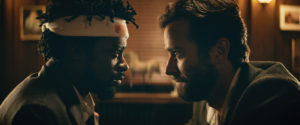
Annapurna Pictures
The story takes place in an alternate present-day Oakland, where black telemarketer Cassius Green (Lakeith Stanfield) develops a calling technique that hurtles him to career success. As he sells out his fellow workers and himself, he loses his artist girlfriend (Tessa Thompson), his friends and eventually much more. Riley, who began his post-film school career as a rapper with the group the Coup, wrote and directed the film and composed its music.
CineMontage interviewed Yabe in New York City in April about the upcoming film, her transition from television to feature films and the importance of mentorship.
CineMontage: Moving from television picture editing to film music editing is a pretty significant shift. What do you miss?
Mitsuko Alexandra Yabe:I came from a place where I was aware of the conversations around the decision-making process that lead to picture changes — why and how scenes changed. Now that I’m in a different department, I am sometimes in the dark. So that’s different.
Creatively, I would say what’s cool about music editing is the ability to delicately treat music in the way that I want. If we want to hear a certain instrument more than others as I’m editing, or lose a certain instrument sooner than another instrument in a queue, we can. But probably the most fun creative process now is working with a composer and tossing ideas back and forth. Actually, on every film I’ve worked, the composer was not based in New York, so I feel like it’s up to me to communicate in-depth the intentions of the director and the rest of the team.
CM: So you have the additional role of translator?
MAY:I’m between the director and the composer, and they both have to be happy. But I have to be happy, too. At the end of the day, the film is my boss; actually, the film is everyone’s boss. If one of our ideas is making the scene work better objectively, then it doesn’t matter where the idea came from. It’s just our jobs to efficiently find that solution and move on to the next note.
CM: Being a musician yourself must be a great asset.
MAY: Composers sometimes come to me and say, “Oh, I left that like this, can you take that and do something with it?” Or, “Oh, I’ll try and get back to it when I can, but in the meantime, can you X, Y and Z it?” Or when I’m working with the picture editor or director and they have a vague want. They sometimes might express it in terms of another composer’s work, in a way that makes sense, but also isn’t specific enough for the composer to address it. So, I would take their general note of“it sounds like John Williams” and try to musically identify where they’re coming from. What aspect of the queue led to that interpretation? Is it the chord progression? Is it the instrumentation? It’s sort of like babysitting the music and watching it grow into something living and breathing in the film.
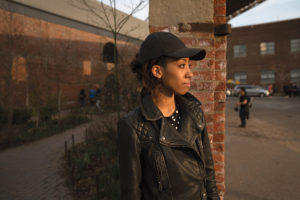
CM: The composer was also the writer/director in Sorry to Bother You. Can you talk about that?
MAY:I think the film’s creative vision was very established early on: that signature sound. Just as Boots describes the film to be “an absurdist dark comedy with magical realism and science fiction inspired by the world of telemarketing,” the all-electronic score texturally adds to the whimsical nature of the narrative. Also, if you listen closely to the lyrics, I’d say that the songs are exploring some of the themes the protagonists explore — giving the audience a meta-experience of the film through music. I’ve never heard a score like that, which really adds to the character of this film.
CM: How did that affect your job?
MAY:For me, it was more about the execution — formatting sessions for the mixer. It was complicated because there was a lot of music with all kinds of atypical instruments. You had wah-waahs with drone scrape or something. I had to organize all these synthesized sounds so that anyone could look at the session and know where things lie in a very short amount of time. If you say, “Okay, all the string instruments are at the top, all the percussions are at the bottom” — that makes sense. So, I listened to every single piece of audio and made sure they were relatively well organized.
There were over 100 pieces of music, so it was wall-to-wall, with everyone feeling pulled from every direction, while we were cutting so close to the holiday season. The band tUnE-yArDs, which recorded the score, was touring at the time, so there was a lot of calling back and forth and trying to figure out the time differences.
CM: Was there a particular area that required a lot of your attention?
MAY:I think I worked a lot on the music’s energy, with the transitions from scene to scene, because some moments are very comedic and I wanted to make sure that the feeling or emotion was being preserved. If it was cut off prematurely, then no one would find the scene funny. There were also many party scenes, so it was making sure the energy of the music was tight.
There’s a big riot scene in the film that we actually made work by pulling back on the music and moving it around in the space; you could actually hear the music better that way. We also tried to really capture the quality of music coming from the various cars, so we worked a lot to get the proper mix for them. The songs were by Boots as well, which was a unique experience that I loved. We spent a lot of time together looking at certain scenes.
CM: Does having the director as composer add another layer?
MAY: It does. Because he’s a musician, Boots’ ability to hear not just the music but the whole sound experience during the mix was so specific. You can hear the quality of a dripping sound hitting a desk or the balance between the sound design and the music. He could articulate so specifically that it made all of our jobs easier.
It’s a joy when that happens, rather than testing out all the time: “Is this right?” “Do you like this?” It also felt like the songs were still being written as I was editing them. There were a lot of phone calls with Boots’ audio engineer in the Bay Area. Boots would ask for another version of the song: “The drums are different here; it’s not loud enough; what about a little bit of the background vocals?” I felt like I was in the middle of a studio — part of the music production of the actual soundtrack — while I was on the stage editing and it was being mixed. I think we really gave it the attention that it deserved. It was highly ambitious given the time frame, but I think we nailed it.
I wish it was like that more often, how freely ideas are tossed around. It can get down to the wire to change things at the last minute, but at the same time, it really did feel like we were being creative to the maximum potential in the allotted time. I think at the end of the day, we’re all in it for that reason, for sure.
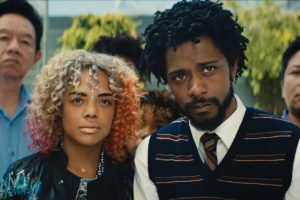
Annapurna Pictures
CM: Tell me about your mentors? How did mentorship fit in with your shift into film music editing?
MAY:I am fortunate to say that I have quite a few mentors within the post-production community here in the city. I was able to build these relationships because I was proactive early on and attended many events at LIPPS [Ladies in Post-Production], Post New York Alliance [PNYA] and master classes at the Editors Guild office. For the Guild, I’ve taken the initiative to join the Diversity Committee and am now serving as an Eastern Region alternate member of the Board of Directors.
CM: So mentorship is important to you…
MAY:Mentorship is crucial — especially given that there are so few opportunities for apprenticeship due to shorter production schedules, tighter budgets, independent digital workflows and stricter guidelines for interns. My colleague, music editor Chad Birmingham, has been an exceptional mentor for me as I made my transition from picture assistant to music editor.
Because mentorship has had such a positive impact on my life, I have taken it upon myself to mentor high school students at Reel Works, a nonprofit organization based in Brooklyn that challenges high-risk teens to tell their stories and be heard. As I have always been the only woman of color in editorial or on the mix stage, I am focusing a lot of my efforts in training youth from all races, cultures and backgrounds.




